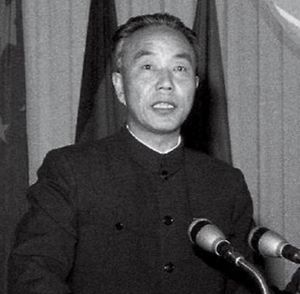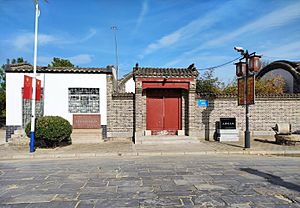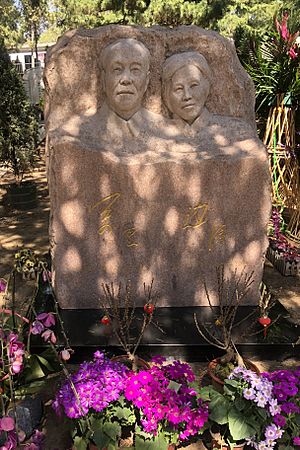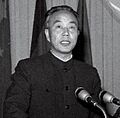Wan Li facts for kids
Quick facts for kids
Wan Li
|
|
|---|---|
| 万里 | |
 |
|
| 5th Chairman of the Standing Committee of the National People's Congress | |
| In office 13 April 1988 – 27 March 1993 |
|
| Preceded by | Peng Zhen |
| Succeeded by | Qiao Shi |
| 4th First Vice Premier of the People's Republic of China | |
| In office 6 June 1983 – 25 March 1988 |
|
| Premier | Zhao Ziyang Li Peng |
| Preceded by | Deng Xiaoping |
| Succeeded by | Yao Yilin |
| 3th Minister of Railways | |
| In office January 1975 – December 1976 |
|
| Preceded by | Lü Zhengcao |
| Succeeded by | Duan Junyi |
| Personal details | |
| Born | 1 December 1916 Dongping County, Shandong, China |
| Died | 15 July 2015 (aged 98) Beijing, China |
| Political party | Chinese Communist Party (1936–1993) |
| Spouse | Bian Tao (邊濤) |
| Children | Wan Jifei |
| Wan Li | |||||||
|---|---|---|---|---|---|---|---|
| Traditional Chinese | 萬里 | ||||||
| Simplified Chinese | 万里 | ||||||
|
|||||||
Wan Li (1 December 1916 – 15 July 2015) was an important Chinese leader. He was a member of the Chinese Communist Party (CCP). Wan Li worked in the government for many years. He held high positions like Vice Premier and leader of China's parliament, the National People's Congress (NPC).
Wan Li joined the Chinese Communist Party in 1936. He helped lead revolutionary activities in his home province of Shandong. After the People's Republic of China was formed in 1949, he worked in different government jobs. He was even in charge of building projects in Beijing. During a difficult time called the Cultural Revolution, he was removed from his job. But he later returned to work. He became the party chief in Anhui province. There, he started important farming changes that helped many people.
In the 1980s, Wan Li became a key leader who wanted to make China more open. He supported changes to the government and laws. He believed leaders should not stay in power forever. He became the head of the national parliament in 1988 and retired in 1993.
Contents
Early Life and Education
Wan Li was born into a poor family in Dongping County, Shandong province. He always wanted to get an education. In 1939, he was accepted into a teacher's college in Qufu. While at school, Wan Li started a book club. They studied ideas about social change.
After a student movement in 1935, many young people wanted to help China. Wan Li went back to his hometown. He became a part-time teacher. He spent most of his time working for the revolution. He encouraged people to resist the Japanese invaders.
Wan Li joined the Chinese Communist Party (CCP) in 1936. He held many important jobs in the party, especially in Shandong province. He led the party in his home county from 1937 to 1938. He also worked in propaganda and organization roles. During the last part of the Chinese Civil War, Wan Li was a key leader in the border areas.
Working for the New China
After the People's Republic of China was founded in 1949, Wan Li took on new roles. He worked in finance and city planning in Nanjing. He also led industrial work in the southwest region. There, he met Deng Xiaoping, who was a very important leader.
In 1952, Wan Li moved to Beijing to work for the central government. He became a Vice Minister of Architectural Engineering in 1953. Then, in 1955, he became the Minister of Urban Construction. From 1958, he helped lead Beijing city. In 1959, he played a big part in building the Great Hall of the People. This huge building was ready for China's 10th anniversary celebrations.
After the Cultural Revolution
During the Cultural Revolution, many leaders, including Wan Li, were removed from their jobs. He was held and had to go through "re-education." This was a difficult time for him.
Wan Li returned to his jobs in Beijing in May 1973. He became the Minister of Railways in 1975. In 1977, he became the First Vice Minister of Light Industry. Later that year, he became the top leader of Anhui Province.
In Anhui, Wan Li started important farming changes after the Cultural Revolution. He introduced the household-responsibility system. This system allowed farmers to divide shared lands. They could then farm their own plots. Some people in Beijing did not like these changes. They thought the changes were not socialist enough. But Wan Li continued with his reforms. He also made it easier for farmers to sell their extra crops. Farmers could grow vegetables on small private plots without paying taxes.
The farming changes in Anhui were very successful. The government praised them as great ideas. Other provinces, like Sichuan, followed Wan Li's example. Leaders like Zhao Ziyang and Deng Xiaoping praised Wan Li. He was seen as a pioneer who helped China's economy grow. People even had a saying: "If you want to eat rice, look for Wan Li."
National Leadership Roles
Wan Li became a member of the Central Committee in 1977. In 1980, he joined the Central Committee Secretariat. He worked closely with General Secretary Hu Yaobang. In April 1980, he became Vice Premier. He also became the Minister of the State Agricultural Commission.
Wan Li became the Vice Premier in 1984. In 1988, he became the Chairman of the Standing Committee of the National People's Congress. This is like being the speaker of China's parliament. Wan Li supported spreading the household responsibility system across the country. He also helped stop a campaign against "spiritual pollution" in the mid-1980s.
After Hu Yaobang resigned in 1987, Wan Li was part of a small group of leaders. This group acted as a temporary top decision-making body. Wan Li was considered for the highest leadership group. However, some older, more conservative leaders did not want him there. They said he "offended too many people."
Deng Xiaoping listened to these concerns. He suggested that Wan Li become the Chairman of the National People's Congress instead. This was still a very important and respected position. Wan Li was not sure at first. He felt he did not know enough about law. But Deng Xiaoping told him he could learn and get help.
Wan Li was elected Chairman of the Standing Committee of the National People's Congress in 1988. He held this position until he retired in 1993.
Tiananmen Square Protests
Wan Li was visiting Canada and the United States during the Tiananmen Square protests of 1989. Many people saw him as a leader who supported reforms. Some believed he would support the students. The National People's Congress, which Wan Li led, had the power to call a special meeting. This meeting could have helped solve the crisis. Many members of the NPC asked for such a meeting.
When Wan Li returned to China on May 25, his plane was sent to Shanghai. There, other leaders met him. They tried to convince him to oppose the student protests. In Shanghai, Wan Li learned that his ally, Zhao Ziyang, had lost power. He also learned that leaders planned to use the military to end the protests.
Wan Li knew he did not have the power to stop this decision. On May 27, he expressed support for the leadership's actions. He specifically supported the martial law announced by other leaders. He did not make many more statements. This suggests he might have agreed to the decision because he had no other choice.
Retirement and Passing Away
Wan Li slowly stepped away from public life after 1993. He believed that retired leaders should not interfere with the government. He passed away on July 15, 2015, in Beijing. He was 98 years old.
In his official obituary, Wan Li was praised as an "excellent Party member" and a "time-tested fighter." It said he was "loyal to the party, loyal to the people, and loyal to the socialist cause." His death was announced as an important event by the top government bodies.
On July 22, 2015, Wan Li's memorial service was held. Flags were flown at half-mast in Beijing. Many top leaders, including President Xi Jinping, attended the service. Former President Hu Jintao was also there.
Images for kids
 | James B. Knighten |
 | Azellia White |
 | Willa Brown |




